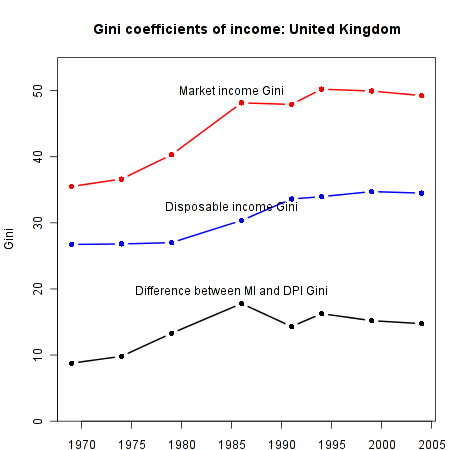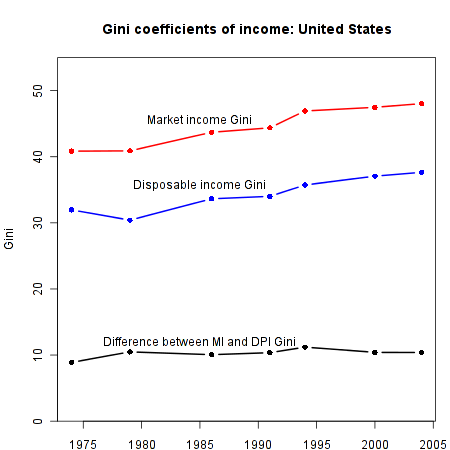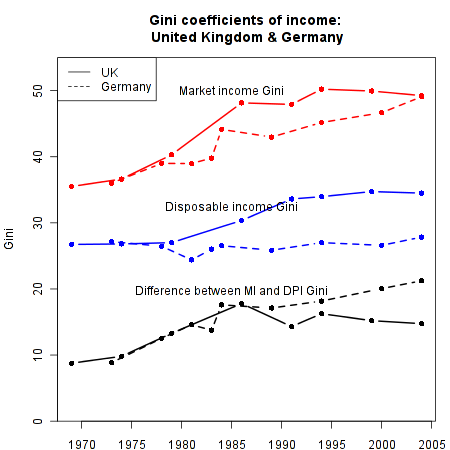A recent [post](http://www.angrybearblog.com/2011/07/investment-consumption-and-progressive.html) from Bruce Webb at Angry Bear gave me a new angle on the fecklessness of our ruling elites, who currently seem incapable of even running capitalism for their own benefit. The basic insight here is that capitalism requires the capitalist class to impose an austere kind of discipline not just on the working class, but on *itself*. And while the breakdown of worker discipline causes well-known problems for capitalism, the decay of capitalist discipline poses difficulties as well.
Doug Henwood has long [observed](http://www.leftbusinessobserver.com/RottingHead.html) (and long threatened to write a book about) the [decay and decomposition](http://www.brooklynrail.org/2009/07/express/ka-pow-bang-crash-down-goes-another-bubble) of the American ruling class. Rather than a disciplined force that seeks to promote the long-run accumulation of capital, our elite increasingly appears short-sighted and avaricious--more interested in looting the system through bailouts and high-end tax cuts than in ensuring the its long term health. Henwood:
> Well, you know it was once the WASP elite, but there ain't none of that now. I think __one of the problems of the United States is that there is a great deal of incoherence at the upper level__, that unlike the WASP ruling class, __there is no social formation that can think in the truly long-term, that can think beyond the short-term concerns__ about the accumulation of money, the most amount of money in the quickest possible time.
Webb's [post](http://www.angrybearblog.com/2011/07/investment-consumption-and-progressive.html) is about something slightly different, but related: is the capitalist class primarily oriented towards accumulation, or towards "consumption and display"?
> __Classical, neo-classical, and neo-liberal economics__ all share a common mistaken psychological premise, one that is simple but deep, and in itself explains why they don't understand the aims of Progressive Taxation.
> Label it how you like, the academic discipline that emerged from England in the 18th and 19th century implicitly, hell I'll make it stronger, __explicitly assumed that the goal of capitalism is accumulation, i.e. getting more an more numbers on the right side of the ledger sheet.__ Which assumption seems blindingly obvious, which is why it is simple and goes so deep. In this model taxation on gains from capital serve to displace investment on the equally simple assumption that if you tax something people do less of it. Again perhaps blazingly obvious.
> But __it doesn't hold up well against the historical record either narrowly considered in relation to 18th and 19th century England or more broadly across cultures and across history. Instead in most of those cultures and most definitely in Georgian and then Victorian England the evidence is strong that capitalists saw investment as the means to different ends, those of consumption and display that in turn would lead to societal status.__ You only have to look at the great Country Houses that were built during this period, with no expenses spared inside or out whether that be on landscape architects or silversmiths.
With respect to my favorite classical (or post-classical) economist, this is only partially in keeping with what Marx thought. True, he believed that capitalists had to accumulate; but he also [thought](http://www.marxists.org/archive/marx/works/1867-c1/ch24.htm#S3) that the capitalist "developed in his breast, a Faustian conflict between the passion for accumulation, and the desire for enjoyment." And he might agree with Webb about what was going on in the 19th Century, but he would see it as a sign of capitalism's ill health. As he [put it in *Capital*](http://www.marxists.org/archive/marx/works/1867-c1/ch24.htm#S3):
> Even __in the early part of the 18th century, a Manchester manufacturer, who placed a pint of foreign wine before his guests, exposed himself to the remarks and headshakings of all his neighbours.__ Before the rise of machinery, a manufacturer's evening expenditure at the public house where they all met, never exceeded sixpence for a glass of punch, and a penny for a screw of tobacco. It was not till 1758, and this marks an epoch, that a person actually engaged in business was seen with an equipage of his own.
> > "The fourth period," __the last 30 years of the 18th century, "is that in which expense and luxury have made great progress__, and was supported by a trade extended by means of riders and factors through every part of Europe."
> What would the good Dr. Aikin say if he could rise from his grave and see the Manchester of today?
> __Accumulate, accumulate! That is Moses and the prophets!__ "Industry furnishes the material which saving accumulates." [23] Therefore, __save, save, i.e., reconvert the greatest possible portion of surplus-value, or surplus-product into capital! Accumulation for accumulation's sake, production for production's sake__: by this formula classical economy expressed the historical mission of the bourgeoisie, and did not for a single instant deceive itself over the birth-throes of wealth. [24] But what avails lamentation in the face of historical necessity? __If to classical economy, the proletarian is but a machine for the production of surplus-value; on the other hand, the capitalist is in its eyes only a machine for the conversion of this surplus-value into additional capital.__
The point Marx is making here is that capitalism doesn't just trap workers within the prison of alienated and exploitative labor, it also subjects capitalists to the endless treadmill of accumulation for the sake of accumulation. (On this point, see also my [earlier](http://www.peterfrase.com/2011/03/capitalism-without-capitalists/) [remarks](http://www.peterfrase.com/2011/07/reanimated-marxism/) on the distinction between *capital* and *capitalists*). This point doesn't often get made, I think, because it's contrary to most Marxists' moral orientation--nobody feels all that bad for the capitalist, and it's still [good to be the king](http://www.youtube.com/watch?v=lZKiYgcgBAY). Nevertheless, to be a good capitalist takes discipline--so what happens when the dominant image of the capitalist is no longer Ebenezer Scrooge, but [Steve Schwarzman's birthday party](http://www.newyorker.com/reporting/2008/02/11/080211fa_fact_stewart)? Says Webb:
> So what does this have to do with progressive taxation? Well once you accept the assumption that the fundamental goal of investment among the upper classes is consumption and display and further that in most cases that consumption doesn't have the multiplicative effects on the wider economy that re-investment would then the goal of progressive taxation becomes obvious, and by the way a lot less socialist than the old shibboleth of redistribution. __The goal of progressive taxation in the classical political liberal position dominate in this country from 1913-1980 was to penalize consumption and favor re-investment. After all at least under current law gains on capital are by and large not exposed to federal taxation until they are realized, if instead they are plowed back into productivity improvements they are at the corporate or individual level largely tax exempt. It is only when you take the equity out in the form of interest, dividends or simply cashing out equity that tax is encured.__
> The logical conclusion of this model is that if we accept the principle that to tax something is to induce people to do it less, if nothing else by increasing its marginal cost, then Supply Side becomes the Voodoo the Elder Bush always said it was. __Lowering top marginal rates and taxing capital gains at half the rates of capital income would under my model have the effect of encouraging consumption and discouraging reinvestment. Whereas high rates would have the opposite effect.__ Which has the advantage of being testable, if we had to constrast the 50s and the 80s in terms of the consumption patterns of the near the top level of capitalists and managers we see a lot less conspicuous consumption among the former than we do in the post Reagan-era. In the 50s and 60s only Greek shipping magnates could afford the kind of consumption patterns that became common in before, during, and after the Enron era and certainly continuing today. From my perspective __all Supply Side did was to lower the cost of consumption in pre-tax dollars, purchases that were inconceivable in the days of 90 and then 70% top rates have become routine in the days of 15%.__
So if the capitalist class was truly able to act as a collective personification of capital, then they would be for progressive taxation! But to bring this back to Henwood's argument, we see instead that the ruling class is too fractious and selfish to impose this kind of discipline on themselves. Instead, they're just trying to make off with as much loot as they can, and live as lavishly as possible. The result is a [plutonomy](http://jdeanicite.typepad.com/i_cite/2009/10/plutonomy.html) in which "There are rich consumers, few in number, but disproportionate in the gigantic slice of income and consumption they take.".
The only counterpoint to this that I can see is that at the very top, the accumulation of money itself is, in Webb's terms, the "display" that "leads to social status". Making money becomes like points in a game, as everyone tries to get the biggest [pool of money](http://www.thisamericanlife.org/radio-archives/episode/355/the-giant-pool-of-money). Why else, after all, would a billionaire hedge fund owner keep trying to grow ever richer, even after accumulating more riches than they or their family could ever consume? Unfortunately, these hoards of money seem mostly to be put to use chasing asset bubbles, high-frequency trading, and other sorts of zero-sum competition rather than investing in productive activity.






